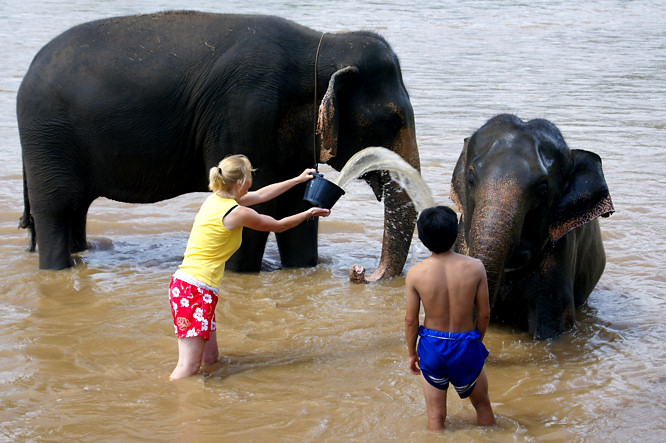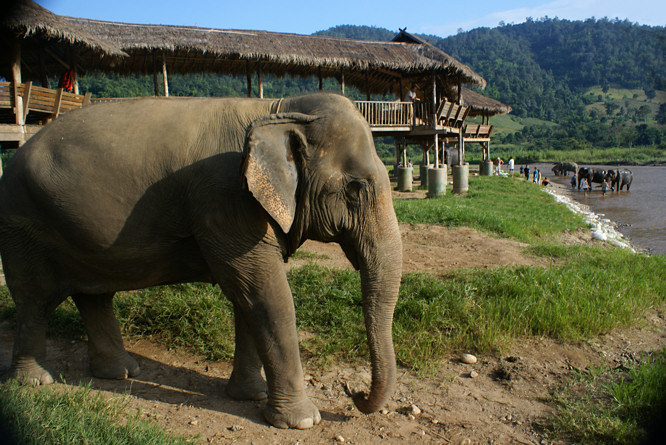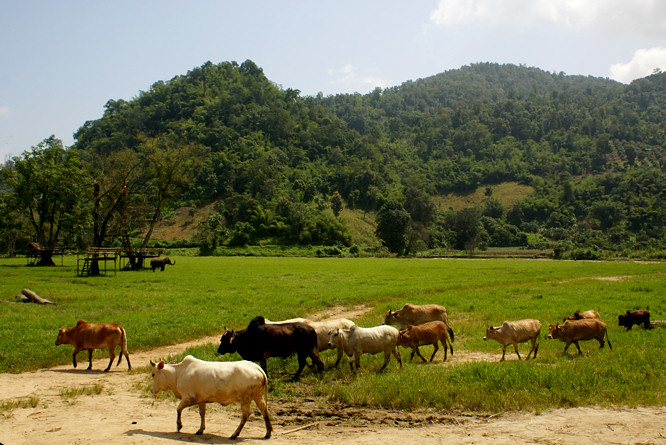Chiang Mai Elephant Nature Park - Elephant Orphanage
The best place in Thailand to interact with Elephants responsibly and not encourage exploitation and cruelty is at the Elephant Nature Park run by Lek, the Elephant Lady, an Asian hero. She has many people of like mind working with her running a true sanctuary where rescued elephants and elephant orphans are allowed to live out their lives in peace and security where they no longer work for humans.

All money received goes to looking after the elephants and eventually buying enough land to incorporate into a national park dedicated to the conservation of Asian elephants in a natural environment. The Elephant Nature Park and foundation is a non-profit organization and needs your support.
The Elephant Nature Park, established in 1995, is about an hours drive outside of Chiang Mai. It is nestled in the magnificent Mae Taeng valley. It is not a place you just turn up for a couple of hours. The minimum experience is the one day trip. It is best to book and pay in advance on their website. They collect you from your hotel. On route to the Elephant Nature Park they play a video inside the bus so by the time you get there you have a better understanding of the aims of the organization. www.elephantnaturefoundationonline.com
Be aware there are no elephant rides or elephant shows at the Elephant Nature Park. This is a conservation park where humans look after, care for the needs of the elephants with love and affection rather than the providing entertainment for humans. If you want to get up close to lots of elephants, stand in the middle of a river in the jungle scrubbing the back of a happy elephant and then hand feed them this is the experience for you.

There are many firms in Thailand offering elephant treks, elephant rides, elephant safaris and so-called mahout training. All these elephants have been trained with the use of violence as a correction tool. Young elephants are broken into submission by being put into a type of cattle 'crush' and poked with very sharp sticks or pieces of metal to cause pain and bloody injuries. Have a look at the shape hooked metal knife tools all the elephant mahout keepers use. Lek is trying to promote re-education. Elephants can be trained with kindness not violence
On your trip to the Elephant Nature Park you will pass other Elephant owning establishments that put on logging shows and elephant safari rides through the jungle. The Elephant Nature Park is based in the valley floor surrounded by mountains covered in lush green tropical hard wood trees. On arrival you are given an introduction and then assigned an elephant to feed. Their breakfast consists of a large bucket of bananas and other fruit. You stand in a wooden building on stilts so you are eye level with the elephants. They use their trunks to collect the fruit from your hands. It is wonderful to feel them use their dexterous trunk on your hands.
You are taken for a walk around the Elephant Nature Park's grounds. Do not put on you best clothes or foot as you get close to elephants who love to have mud baths after there daily wash in the river. Choose your footwear wisely. You may accidentally tread in some elephant or cow poo. You will also want wear something on your feet when you are in the river.

Like most babies they need to sleep during the day. There is a covered corral designed for mothers and babies. We witnessed the handlers singing Thai lullabies to the baby elephants to get them to nod off to sleep.
A large vegetarian Thai lunch is served in the main stilted building. The quality was outstanding considering you were in the jungle. What an experience. There is no other restaurant like it. Down below at ground level there are elephants walking around free to go where they want. The steep sided hills surround the valley. The scenery is like the dramatic landscapes you see in Vietnam war films. You expect to see a Huey helicopter squadron appear over the hills at any moment.
After lunch it is bath time. The Elephant Nature Park herd is broken up into smaller 'family' groups. They take it in turn to come down to the river to get washed. The river only comes up to your thighs in the deepest parts. You are given a bucket and some scrubbing brushes to thoroughly soak the elephant you are given to wash. Once wet you have to scrub the coarse hairy thick hide. Expect to get completely wet so bring a change of clothing to go home in. A plastic bag should also be packed to put them in.
Sangduen Chailert (Lek) was born in 1960 and lived in a remote mountain village in northern Thailand. Even though she came from a poor background she managed to obtained a university education. In 1996 she with her husband Adam she managed to scrape enough money together to start the Elephant Nature Park. Lek's life long quest is to provide a sanctuary for elephants to live in a peaceful natural environment. When Lek was young she cared for an elephant. This led to her working in the jungle forests with other elephants. Medical care was administered to sick elephants in remote areas with the help of a vet.
The Elephant Nature Park's current herd includes disabled, orphans, blind and rescued, elephants of all ages. Here charges mainly come from private owners. They are not given freely even though they are in pain and not suitable for work. Lek has had to negotiate fees to enable them to join her herd. Many outlived their usefulness to the loggers while others became useless to the tourist trekking camp owners through injuries cause by over use.
Lek uses local Buddhist beliefs and sacred saffron cloth to tie around each trees to protect them from logging. One of her many interests is the preservation of the Thai forest. Locals are reluctant to cut down these trees fearing insults to jungle spirits. She eventually wants to be able to buy enough land to preserve the natural environment and enable elephants to roam free on. She wants to run it like a national park.
Asian cows, water buffalo and dogs
The Elephant Nature Park has also provided a refuge to a herd of Asian cattle, water buffalo and a pack of abandoned dogs that run wild inside the park.
Bamboo education
Bamboo is elephant food in the wild. Bamboo is being harvested and the forests depleted of this natural resource. Part of the Elephant Nature Park work is to try and educate villagers to use other material like bricks to build houses. Bamboo only lasts about five years. New Bamboo has to be obtained to construct a replacement.
It is much more economical in resources and human effort to build with sun dried mud bricks instead of bamboo. Rice hulls are added to the mud to make them stronger. To make the brick walls stronger and water proof they are covered with a sand based plaster which acts as a sealer. The walls absorb and deflect heat so it is cooler when the weather is hot and warmer when it is cold.
Elephants eat dung
This looks disturbing when you first see it, elephants eating the dung of other elephants. Baby elephants are not born with the necessary microbes to digest cellulose, plant matter and the only way they can attain these microbes is by eating the dung of others, most often their mothers or another older elephant.
It is common to see a mother elephant rub dung on her young calf or to see a young elephant pick up a bolus of dung fresh out of their mother's bottom, play with it and put some in their mouth. Yuk but necessary. The frozen baby mammoth carcasses found in melting tundra when dissected by scientists have also found mammoth dung in the stomachs.
Travel books

